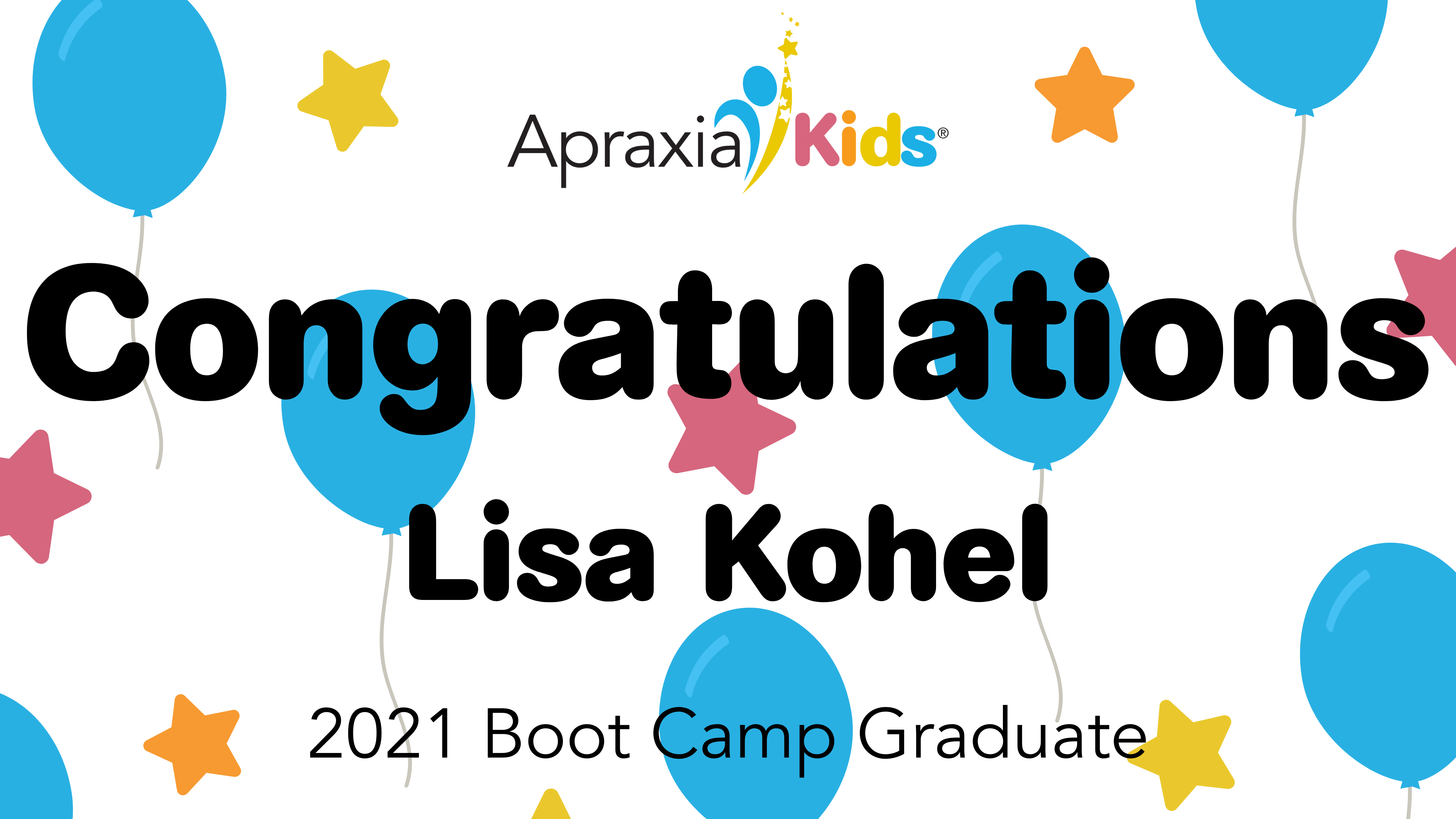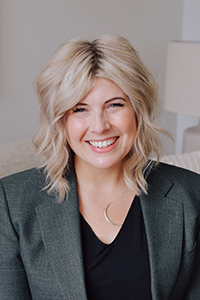
25 Jan CONGRATULATIONS LISA KOHEL, MEd, MSLP, R.SLP(C)!

Congratulations to Lisa Kohel, Med, MSLP, R.SLP(C), for graduating from the Apraxia Kids Intensive Training Institute (Apraxia Boot Camp)!
I am dual trained as an Elementary Teacher as well as a Speech Language Pathologist. Since 2014, I have been trained and mentored by Dr. Megan Hodge from the University of Alberta in the area of motor speech disorders, including Childhood Apraxia of Speech. I have recently completed Apraxia Kids Boot Camp Training and I currently volunteer as a board member for Apraxia Kids Canada. My private practice focuses on children with severe and persisting speech disorders and improving both spoken and written language proficiency. My clinical interests include the treatment of children with a history of severe speech disorder and co-occurring Developmental Language Disorder (DLD), improving academic outcomes for this population of students, and exploring interprofessional collaboration between SLPs and Teachers, as it relates to language-literacy achievement.
Lisa Kohel offers services in St. Albert, Alberta, Canada.
Check out Lisa’s Apraxia Kids SLP Directory Listing to learn more.
Apraxia Kids: What are the top 3 things you learned from this training experience?
Lisa: 1) Ask questions! 2) There is no “one way” to determine a diagnosis for every child/situation. It is ok to use informed, careful clinical judgement. 3) Application of PML to treatment sessions – examples of what each of these means in terms of treatment for us as SLPs.
Apraxia Kids: How did the boot camp experience change or expand your network of colleagues/friends?
Lisa: It allowed me to connect with such a diverse group of SLPs across Canada and the US. I was able to hear from them and learn from them. So wonderful!
Apraxia Kids: How have you implemented the knowledge you gained at boot camp?
Lisa: I have started not being afraid of the DEMSS! I have started incorporating it into my assessment procedures on a regular basis, when it is possible. I also have looked carefully at my lesson plans and thought about how I can incorporate more random practice within what I am already doing. I have started using Dr. Preston’s Speech Motor Chaining program for some of my clients and I also plan to explore ReST in the near future! Very much looking forward to that.
Apraxia Kids: What is an example of how you have been able to (or plan to) use your expertise as a local resource/support for other professionals and/or families since attending the intensive training?
Lisa: Currently, I am mentoring 2 SLPs that are “newer” grads. The purpose of this mentorship is to help deliver services to families who come to me. Having the Apraxia Kids designation has helped me have the confidence to do this, now.
Apraxia Kids: What would you say to someone considering applying to boot camp next round?
Lisa: Go for it! My application was not accepted the first time I applied, but a mentor of mine encouraged me to keep applying and I am so glad she did. I feel proud of my accomplishment.

Congratulations to Lisa Kohel, Med, MSLP, R.SLP(C), for graduating from the Apraxia Kids Intensive Training Institute (Apraxia Boot Camp)!
I am dual trained as an Elementary Teacher as well as a Speech Language Pathologist. Since 2014, I have been trained and mentored by Dr. Megan Hodge from the University of Alberta in the area of motor speech disorders, including Childhood Apraxia of Speech. I have recently completed Apraxia Kids Boot Camp Training and I currently volunteer as a board member for Apraxia Kids Canada. My private practice focuses on children with severe and persisting speech disorders and improving both spoken and written language proficiency. My clinical interests include the treatment of children with a history of severe speech disorder and co-occurring Developmental Language Disorder (DLD), improving academic outcomes for this population of students, and exploring interprofessional collaboration between SLPs and Teachers, as it relates to language-literacy achievement.
Lisa Kohel offers services in St. Albert, Alberta, Canada.
Check out Lisa’s Apraxia Kids SLP Directory Listing to learn more.
Apraxia Kids: What are the top 3 things you learned from this training experience?
Lisa: 1) Ask questions! 2) There is no “one way” to determine a diagnosis for every child/situation. It is ok to use informed, careful clinical judgement. 3) Application of PML to treatment sessions – examples of what each of these means in terms of treatment for us as SLPs.
Apraxia Kids: How did the boot camp experience change or expand your network of colleagues/friends?
Lisa: It allowed me to connect with such a diverse group of SLPs across Canada and the US. I was able to hear from them and learn from them. So wonderful!
Apraxia Kids: How have you implemented the knowledge you gained at boot camp?
Lisa: I have started not being afraid of the DEMSS! I have started incorporating it into my assessment procedures on a regular basis, when it is possible. I also have looked carefully at my lesson plans and thought about how I can incorporate more random practice within what I am already doing. I have started using Dr. Preston’s Speech Motor Chaining program for some of my clients and I also plan to explore ReST in the near future! Very much looking forward to that.
Apraxia Kids: What is an example of how you have been able to (or plan to) use your expertise as a local resource/support for other professionals and/or families since attending the intensive training?
Lisa: Currently, I am mentoring 2 SLPs that are “newer” grads. The purpose of this mentorship is to help deliver services to families who come to me. Having the Apraxia Kids designation has helped me have the confidence to do this, now.
Apraxia Kids: What would you say to someone considering applying to boot camp next round?
Lisa: Go for it! My application was not accepted the first time I applied, but a mentor of mine encouraged me to keep applying and I am so glad she did. I feel proud of my accomplishment.
Credentials:
Hours of Operation:
Treatment locations:
Address:
,
Phone:
Email:
Overall Treatment Approach:
Percent of CAS cases:
Parent Involvement:
Community Involvement:
Professional consultation/collaboration:
Min Age Treated:
Max Age Treated:
Insurance Accepted:




